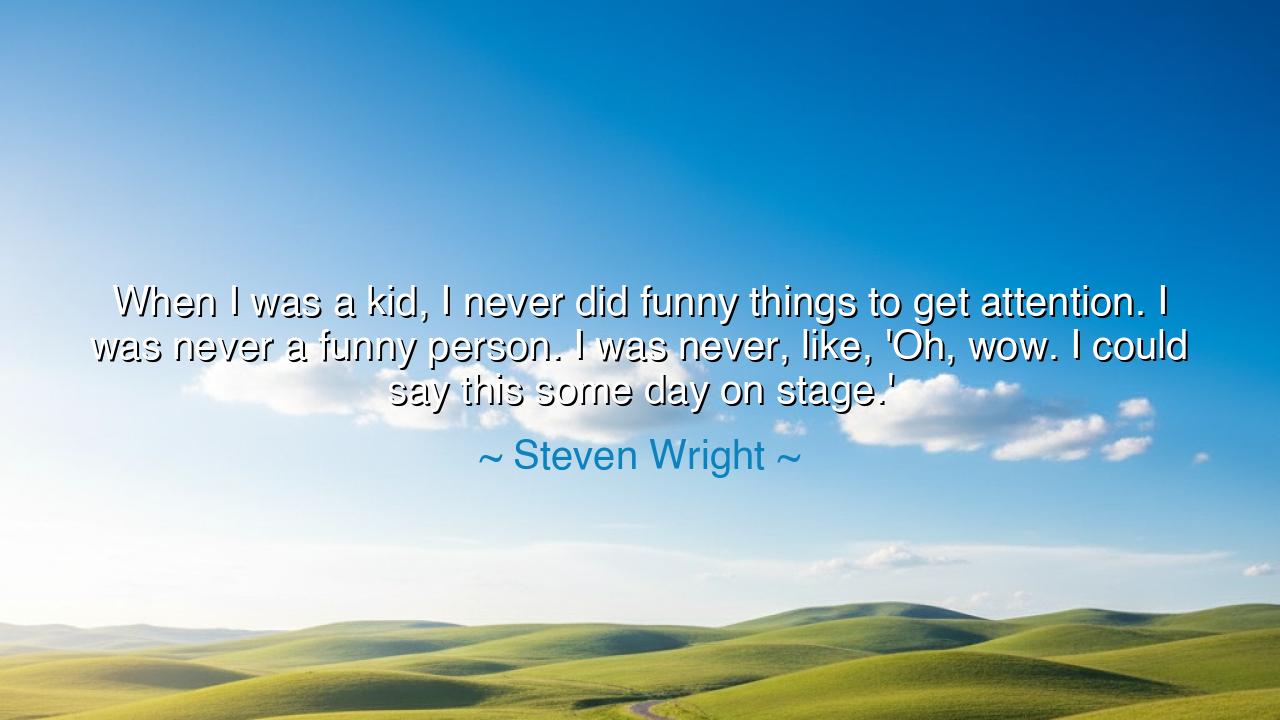
When I was a kid, I never did funny things to get attention. I
When I was a kid, I never did funny things to get attention. I was never a funny person. I was never, like, 'Oh, wow. I could say this some day on stage.'






“When I was a kid, I never did funny things to get attention. I was never a funny person. I was never, like, ‘Oh, wow. I could say this some day on stage.’” — so spoke Steven Wright, the quiet sage of comedy, whose words unfold not in noise but in stillness. He is a man whose humor drifts like smoke — subtle, dry, profound. In this reflection, he reveals a paradox of authentic genius: that greatness often grows not from ambition, but from silence, not from hunger for attention, but from the natural unfolding of one’s own mind. His words carry the humility of a craftsman who did not seek the stage — yet the stage found him.
In his statement lies a sacred truth that the ancients knew well: that art is not born of striving, but of being. The Greeks spoke of the daemon, the guiding spirit within each person, which reveals itself not through force, but through quiet alignment with one’s nature. Wright confesses that he was never “a funny person” — meaning he did not chase laughter or live for applause. Instead, his comedy came as water flows from a spring: not planned, not pretended, but pure. The funny was not something he performed; it was something he perceived. His eyes saw what others missed — the absurdity, the simplicity, the strange poetry of life itself.
The ancients would have called such a gift the art of observation, the seeing beyond surfaces. For the world rewards those who speak loudly, but wisdom often belongs to the quiet. When Wright says he never sought attention, he echoes the lesson of the philosopher Lao Tzu, who taught that the greatest rivers do not fight their way to the sea — they follow their course naturally, and by yielding, they conquer. In the same way, Wright’s humor flows from calm perception, not from noise. His stillness became his power. His restraint became his voice.
This paradox of greatness — that the one who least seeks fame may best deserve it — can be seen across history. Consider Vincent van Gogh, who never painted for recognition, but for truth. Or Emily Dickinson, who wrote in solitude, her words unseen until long after her death. Each lived not to impress, but to express. Wright belongs to this lineage of quiet creators, those who remind the world that one need not shout to be heard. His humor is not the laughter of jesters, but the laughter of philosophers — slow, subtle, thoughtful, and enduring.
The meaning of his reflection, then, extends beyond comedy. It speaks to all who labor to find their place in the world. We are surrounded by the noise of self-promotion, by the endless hunger to be noticed, admired, followed. Yet Wright’s example teaches that what is real will rise in its time. The seed does not demand sunlight; it grows patiently until the light finds it. So too must the artist, the thinker, the dreamer trust in their nature. What matters is not whether the world is watching, but whether one’s voice is true.
There is also in his words a quiet courage — the courage to not perform, to remain oneself even when the world rewards performance. As a child, Wright did not chase laughter because he did not need it to define him. That stillness, that inwardness, became the soil from which his art grew. In an age where attention often feels like survival, his humility is revolutionary. It reminds us that the purest creativity springs not from desire for validation, but from curiosity — the quiet joy of noticing the strange, the beautiful, the profound in the ordinary.
So let this teaching be carried forward: Do not force your destiny — discover it. Let your art, your work, your laughter come not from seeking attention, but from seeking truth. If you are quiet, be quiet. If you are reflective, remain so. The world has enough noise. In time, what is genuine will find its audience, as the still pond finds its reflection. And when it does, your gift — like Steven Wright’s — will not merely entertain; it will endure, because it came not from ambition, but from the patient unfolding of who you truly are.






AAdministratorAdministrator
Welcome, honored guests. Please leave a comment, we will respond soon